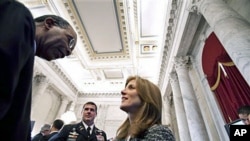Fifty years ago, U.S. President John F. Kennedy established the Peace Corps to promote peace and friendship between the U.S. and other countries. Since then, 200,000 volunteers have served as health workers, teachers, and technical advisers in many countries.
“The fact that you are willing to do this for our country, and in the larger sense, as the name suggests for the cause of peace and understanding, I think should make all Americans proud and make them all appreciative,” said Kennedy.
The volunteers were mostly idealistic college graduates in their 20s. Barbara Joe, however, waited until she was 62 to join up.
“I always had it in the back of my mind since 1961 that I would like to join the Peace Corps one day. We had children, we moved, I got divorced, I lost my son, my foster son, and then I finally said, ‘Well, if I’m going to do it, I better do it now.”
Eleven years ago, Joe went to Honduras where she was a health volunteer. The experience helped her heal from the past.
“I found I was able to help Honduran parents who had lost their kids,” she said.
Joe says although working in Honduras was challenging, the experience was so worthwhile that she signed up for a second two-year tour.
She wrote a book about her experiences called "Hope and Triumph," the names of the Honduran villages where she worked.
She said only seven percent of Peace Corps volunteers are over the age of 50 and she hopes more older people will join.
"In a developing country, they enjoy more respect. Secondly, they have life experience. They don’t get depressed, homesick, as much, at least in my experience, and often have more skills,” said Joe.
Emily Doerr was a more typical volunteer. She joined the Peace Corps after college. Four years ago, she went to Mali. She lived in a village, learned the local language and taught people about nutrition.
“One of the biggest impacts by Peace Corps volunteers is the fact that they’re integrated and they speak the language, and they dress the same and while we obviously don’t blend in completely, we’re trying really hard,” said Doerr.
She said she went in being idealistic and came out more realistic. “Development is not easy. It doesn’t happen overnight,” she noted.
Doerr said her Peace Corps experience made it easier to get a job in international development.
Now she works on education projects at the Agency for International Development, a government organization that provides humanitarian assistance to other countries.
“Peace Corps gave me real work experience. And I think employers like to see that because they like to know that you can do things without being micro-managed or being told what to do,” said Doerr.
As for Joe, today she's a Spanish translator in Washington. She returns to Honduras almost every year with a group that delivers medical supplies and operates on children in poor communities.
She's 73 now and would like to be a Peace Corps volunteer again - anywhere.
“If I reach the ripe old age of 80, I’ll retire from interpreting, and then I’d like to go into the Peace Corps for six months. They have a program, if you once completed it, you can go for six months,” said Joe.
Joe and Doerr say the Peace Corps changed their lives. They hope they also changed the lives of others.




